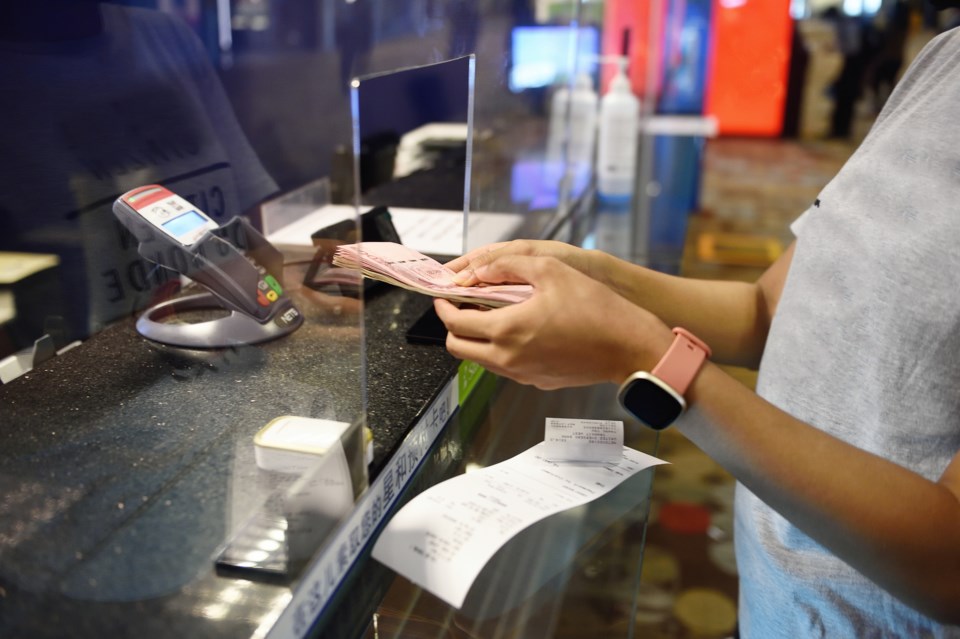A trial date has been set for the case of a Richmond realtor suing a local currency exchange for more than $430,000, claiming the business scammed his client.
In 2020, An Dong Pan referred a client friend, a Mr. Chen, to an acquaintance, Jing Cai, who, as it turned out, worked for currency exchange Jindinglai Holding Ltd., based out of Parker Place on No. 3 Road.
However, Pan claims Chen, after depositing 2,371,850 RMB into a designated bank account in China, never received the promised $445,000 (CAN).
Not long afterwards, Pan decided to take over the debt owed to his client friend and began his legal pursuit of the exchange owners Jia Hao Dong and Xu Dong Liu, as well as the aforementioned employee Cai.
In his lawsuit, Pan claims that Dong, Liu and their employee Cai had breached the currency exchange agreement with Chen and failed to repay him. He also alleged that Dong and Cai used money they owed him to maintain or improve Dong and Cai’s properties.
Cai has denied ever telling Pan she had money available for exchange and said she had acted as an agent for Dong and Liu by introducing customers to them. No responses from Dong or Liu were found in court records.
After Dong failed to file his response to Pan’s claim in time, a default judgment was granted to Pan in November 2021, ordering Dong to pay Pan $431,000 and court fees adding up to $960.
The case is set to go to trial later this year for eight days starting November 14.
Parents of business owner accused of being involved
According to court records, Pan also filed another civil suit against Liu last November, this time including her parents Jie Liu and Hui Lan Shan.
He accused the parents of being involved in Liu’s business and the alleged scam, and suggested they had “fraudulently diverted and misappropriated” money Liu and her husband owed him for maintaining, improving or financing their condo on Odlin Road.
He claimed that the parents subsequently put the property up for sale and “intend to return to China to avoid any responsibility for their actions.”
Pan’s claims came after another alleged victim, Judy Mo, sued Liu and her parents for the same thing earlier in August 2022.
The parents had listed the condo for sale earlier in April of the same year, and the sale was completed a few months later in November, with the court ordering $431,000 from the sale proceeds to be kept in trust while the court decided how much money should be kept as security for Pan’s claim against the parents.
However, upon an application from the parents, the Honourable Justice Simon Coval decided in February this year that the parents would be entitled to take the $431,000 back, except for $21,500, which would serve as the security for Pan’s claim.
“… there is no evidence of the Parents having any involvement in the transaction on which (Pan) sues, and they deny such involvement. At this stage, the claim against them is just speculation and accusation,” said Coval, who decided Pan couldn’t demonstrate a good arguable case against the parents.
Coval added that Pan couldn’t produce evidence of the parents’ involvement, did not participate in the transaction in question and had “never met or communicated” with the parents.
He also noted that there was “no compelling evidence” that there was a risk of the parents dissipating their assets, as they put the Odlin condo up for sale before claims or allegations were made against them.
Liu and Dong’s position regarding Pan’s claims were also summarized by Coval, who said Liu claimed to have “only a minor role” in Pan’s client friend’s transaction by merely informing her husband Dong of the business and forwarding banking information to Cai.
Meanwhile, Dong told Coval his supplier kept the money and didn’t give him the matching Canadian funds.
Based on regulations from China’s State Administration of Foreign Exchange, Chinese nationals are limited to an annual foreign exchange quota equivalent to $50,000 (US).
As such, according to the Financial Transactions and Reports Analysis Centre of Canada (FINTRAC), diaspora communities from countries such as China and Iran often make use of underground banking to overcome currency controls or sanctions.
A search of court records indicates that Pan was not the only one accusing Dong and Liu for failing to repay money they received for currency exchange purposes. At least four other civil suits with similar accusations were filed against the couple between 2020 and 2022, with claims adding up to almost $1 million.



